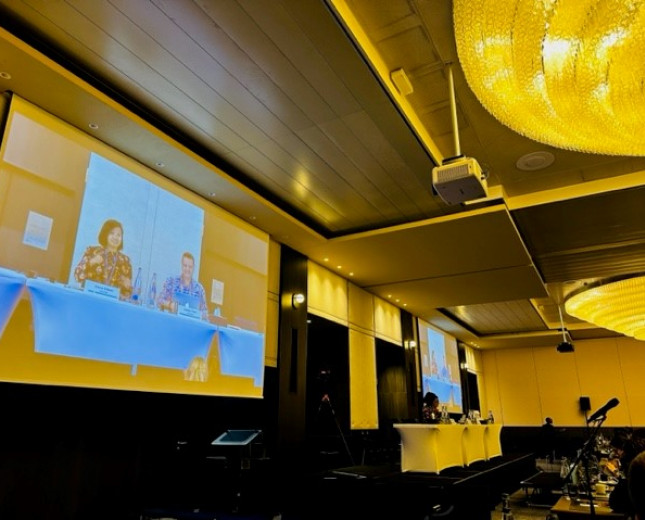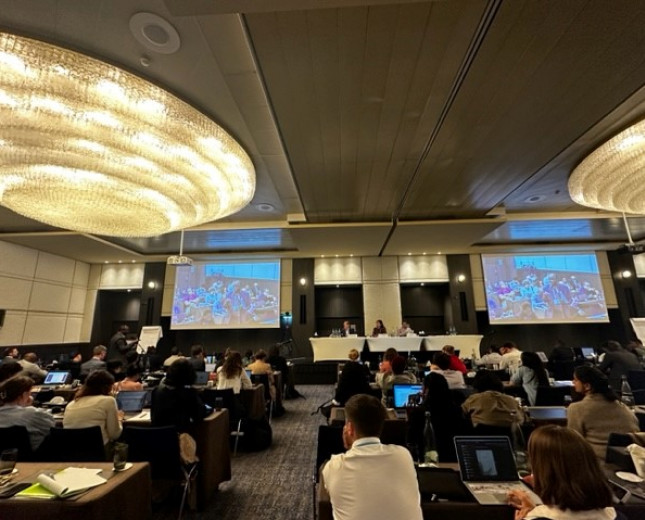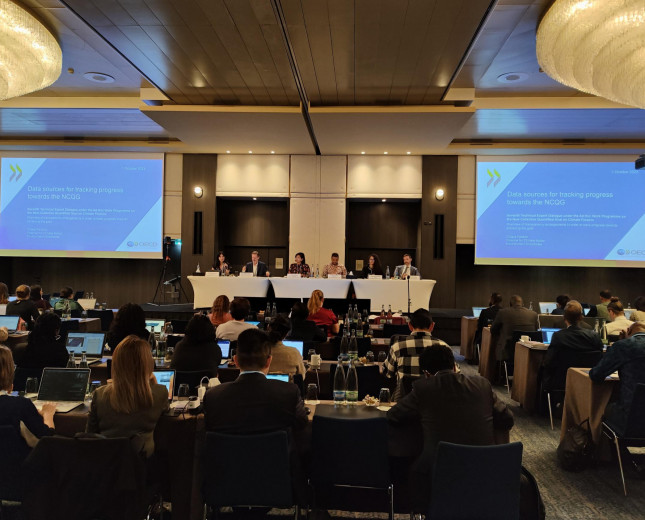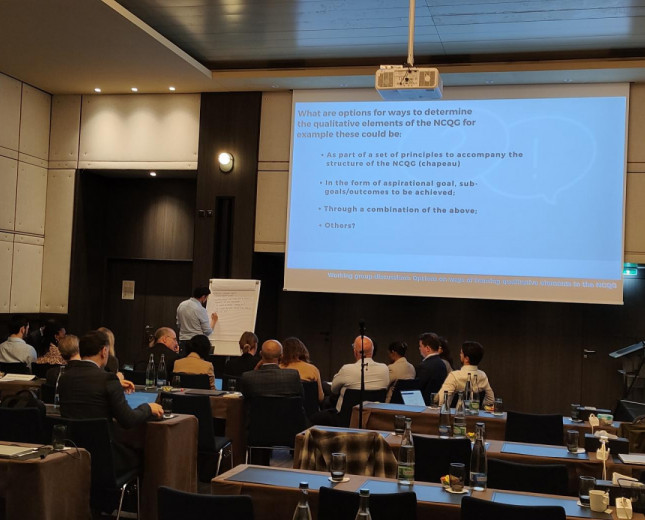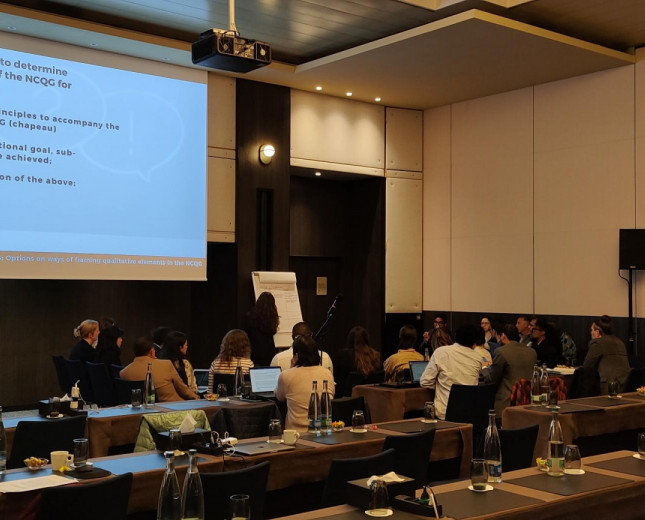Background
At COP 21, Parties decided that, in accordance with Article. 9, paragraph 3, of the Paris Agreement, the CMA will set a new collective quantified goal on climate finance (NCQG) from a floor of USD 100 billion per year, taking into account the needs and priorities of developing countries, prior to 2025. CMA 1 decided to initiate at its third session, in accordance with Article 9, paragraph 3 of the Paris Agreement, deliberations on setting the NCQG from a floor of USD 100 billion per year in the context of meaningful mitigation actions and transparency of implementation and taking into account the needs and priorities of developing countries, and agreed to consider in those deliberations the aim to strengthen the global response to the threat of climate change in the context of sustainable development and efforts to eradicate poverty, including by making finance flows consistent with a pathway towards low greenhouse gas emissions and climate-resilient development.
At CMA 3, Parties decided that the NCQG aims at contributing to accelerating the achievement of Article 2 of the Paris Agreement of holding the increase in the global average temperature to well below 2 °C above pre-industrial levels and pursuing efforts to limit the temperature increase to 1.5 °C above pre-industrial levels, recognizing that this would significantly reduce the risks and impacts of climate change; increasing the ability to adapt to the adverse impacts of climate change and foster climate resilience and low greenhouse gas emission development in a manner that does not threaten food production; and making finance flows consistent with a pathway towards low greenhouse gas emission and climate-resilient development.
In March 2023, the co-chairs of the ad hoc work programme on the new collective quantified goal on climate finance (NCQG) developed a workplan that outlined the preliminary themes for discussions at each technical expert dialogue in 2023, in order to develop options across all elements of the goal ahead of CMA 5 for consideration by Parties, including, inter alia, quantity, quality, scope and access features, as well as sources of funding, of the goal and transparency arrangements to track progress towards achievement of the goal, without prejudice to other elements that will also be considered as the deliberations evolve, including matters relating to time frame. Accordingly, the seventh technical expert dialogue (TED) will focus on the themes “Quality” and “Transparency arrangements”.
Following the previous decisions taken by the CMA on the aim of the NCQG and its elements, and building on previous TEDs (See TED 1, TED2, TED 3, TED 4, TED 5 and TED 6), as well as submissions by and consultations with Parties, TED 7 will address themes related to quality and transparency arrangements. It will also revisit issues identified that require technical considerations related to those two elements.
- On Quality, previous discussions under the TEDs and submissions, elaborated on views related to the scope of qualitative elements, including principles and outcomes. More specifically, participants and submissions contained views on the composition of, enhanced access to, and impact and effectiveness of climate finance, well as the need to avoid increasing debt distress of developing countries, and how these could be captured in the structure of the NCQG, e.g. as aspirational sub-goals/targets, indicators of success, qualitative elements of an overarching goal, etc. Furthermore, building on discussions at TED 6 that identified options of capturing elements related to themes under the goal in a qualitative manner, sources of finance or the role of public and private sector finance, TED 7 provides the opportunity to further elaborate on these options and identify how to reflect these in the outcome when setting the NCQG.
- On Transparency arrangements, previous discussions and submissions emphasized the need to build on lessons learned from the goal of jointly mobilizing 100 billion per year which did not elaborate on transparency and tracking arrangements. More specifically, participants and submissions discussed, among others:
- Tracking and reviewing progress on the NCQG, including sources of information, tools, modalities by which to report on ongoing efforts towards achieving the goal and the need to build on existing arrangements under the UNFCCC, most notably the Biennial Transparency Reports under the Enhanced Transparency Framework, as well as and whether or not to define a baseline of the NCQG and indicators to enable tracking and review progress and the need for (a) climate finance definition(s), recognizing ongoing work in this regard, most notably the work of the Standing Committee on Finance:
- Preparation of an aggregate report that is similar to the progress report on the USD 100 billion goal prepared by the Standing Committee on Finance;
- Periodic reviews of the NCQG, including possible tools, modalities and timeframes.
Building on previous discussions and submissions, TED 7 will reflect on views, further elaborate them and identify options on how to consider these in the final outcome when setting the NCQG.
Objective
The objective of TED 7 is therefore to discuss and identify:
- Options for ways to reflect qualitative elements of the NCQG;
- Options for setting up transparency arrangements to track progress towards achieving the NCQG.
Format and participation
The technical expert dialogues are mandated to be held in different regions. The seventh technical expert dialogue will take place over three days in Geneva, Switzerland, and is open to nominated Party and non-Party stakeholders for on-site participation. To ensure inclusive and broader participation, the dialogue will be held in a hybrid format, enabling virtual participation. As mandated, the dialogue will have webcast.
Similar to TED 5 and TED 6, TED 7 will be organized to facilitate technical discussions on the NCQG, comprising primarily of focused working groups where participants are tasked with identifying and developing options, including challenges and opportunities, for specific elements of the NCQG. Depending on the topic, scene-setting presentations will provide an overview of the discussion topics prior to working group sessions to help inform the tasks of identifying options. Following the working group sessions, sufficient time will be dedicated to report back on options identified, and for open discussion among all participants to exchange views. In addition, the technical expert dialogues also present an opportunity for dynamic and interactive exchanges of a wide range of perspectives and experiences on the potential design and implementation of the NCQG.
The provisional programme presents the themes and topics for discussion at the TED 7. It takes into account the views expressed by Parties and non-Party stakeholders in their submissions as well as the views expressed during informal consultations held with interested groups of Parties upon their request as at September 2023. Guiding questions for each topic are outlined further below.
Provisional programme
Webcast Day 1
Webcast Day 2
Webcast Day 3
|
Day 1: Saturday, 30 September 2023
|
| Time (CEST) |
Session titles/description |
Speakers and Facilitators |
| 08:00 |
Registration |
|
09:00–09:45
|
Opening and introductory remarks (45 min) |
Welcoming remarks (20 min)
- Daniele Violetti, UNFCCC secretariat
- Gabriela Blatter,bio Federal Office for Environment, Government of Switzerland
- Ambassador Mohamed Nasr,bio COP27 Presidency lead negotiator
Introduction by the co-chairs (15–20 min)
Overview of the organization of the seventh technical expert dialogue by the co-chairs
Moderators: Fiona Gilbert and Zaheer Fakir, co-chairs of the ad hoc work programme on the NCQG bio
|
| 09-45–10:15 |
Ways to reflect qualitative elements of the NCQG
This session will kick start with remarks on climate finance goal setting. It will then feature examples of setting qualitative elements of a goal or target in other multilateral processes. It will provide an opportunity to gain insights on the approach taken for setting such elements and discuss how the NCQG could learn from experiences gained in other multilateral processes, including on challenges and opportunities. |
Scene-setting presentation (15-20 min)
Remarks
- Amar Bhattacharya,bio Brookings Institution
Presentations
Open discussions
Moderator: Preety Bhandari,bio World Resources Institute
|
| 10:15–10:30 |
Coffee break |
| 10:30–10:45 |
Introduction to working groups (15 min)
The co-chairs will briefly outline the approach and modalities for the working group sessions and divide in-person participants into five working groups and the virtual participants separately.
|
Moderators: Fiona Gilbert and Zaheer Fakir, co-chairs of the ad hoc work programme on the NCQG |
| 10:45–12:00 |
Working groups: Options on ways of framing qualitative elements in the NCQG (75 min)
Participants are invited to discuss in working groups:
- What are options for ways to determine the qualitative elements of the NCQG for example these could be:
- As part of a set of principles to accompany the structure of the NCQG (chapeau)
- In the form of aspirational goal, sub-goals/outcomes to be achieved;
- Through a combination of the above;
- Others?
|
| 12:00–13:30 |
Lunch |
|
13:30–14:45
|
Working groups (75 min): Options on ways of framing qualitative elements in the NCQG (continuation)
- Qualitative elements to consider, include, among others:
- Composition of, enhanced access to, and impact and effectiveness of climate finance
- Debt stress of developing countries
- Others?
- How to measure progress towards achieving those elements?
|
| 14:45–15:00 |
Coffee break |
| 15:00–15:10 |
Ice breaking activity (10 minutes)
|
Moderators: Fiona Gilbert and Zaheer Fakir, co-chairs of the ad hoc work programme on the NCQG |
| 15:10–16:10 |
Report back and discussions (60 minutes)
|
Breakout group moderators
Moderator: Preety Bhandari, World Resources Institute
|
| 16:10 – 16:30 |
Wrap-up of the day (10–15 min) |
Moderators: Fiona Gilbert and Zaheer Fakir, co-chairs of the ad hoc work programme on the NCQG |
|
Day 2: Sunday, 1 October 2023
|
| Time (CEST) |
Session titles/description |
Speakers and Facilitators |
|
09:00 – 09:10
|
Recap and introduction |
Recap from day I
Moderators: Fiona Gilbert and Zaheer Fakir, co-chairs of the ad hoc work programme on the NCQG |
|
09:10 – 9:40
|
Overview of transparency arrangements in order to track progress towards achieving the goal (30 min)
This session will present an overview of possible modalities for setting up transparency arrangements under the NCQG in order to track progress towards achieving the goal. It will feature examples including the current transparency arrangements under the UNFCCC as well as other tracking and reporting systems and reflect on the timelines, modalities and possible implications when considering options related to transparency arrangements. |
Open discussions
Moderator: David McCauley, bio Senior Climate Finance Consultant
|
| 09:40 – 10:50 |
Working groups (75 min) Options for tracking and reviewing progress on the NCQG
- Which aspects, if any, are currently not covered under the Enhanced Transparency Framework that are necessary to track progress towards achieving the NCQG (e.g. multilateral outflows, private sector finance reporting, support related to Art. 2.1(c) etc.)?
- Which other tracking and reporting systems, if any, offer insights relevant to NCQG?
|
| 10:50 – 11:20 |
Coffee break |
| 11:20– 12:35 |
Working groups (75 min) Options for tracking and reviewing progress on the NCQG (continuation)
Options for an aggregate reporting of the NCQG, e.g.:
- The type of a periodic technical aggregate report:
- by the UNFCCC secretariat;
- the SCF;
- the OECD;
- a joint report by the UNFCCC secretariat and the OECD;
- any other institutions.
- The frequency of the report, e.g.
- biennial to track progress towards the end of the goal?;
- According to set milestones?), taking into account that data on climate finance provided will only be available two years after the reporting year.
In discussing options, participants will be invited to reflect on challenges and opportunities associated with implementing each option.
|
| 12:35– 14:00 |
Lunch |
| 14:00–14:10 |
Ice breaking activity (10 min)
|
Moderators: Fiona Gilbert and Zaheer Fakir, co-chairs of the ad hoc work programme on the NCQG |
| 14:10–15:10 |
Report back and discussions (60 minutes)
|
Breakout group moderators
Moderator: David McCauley, Senior Climate Finance Consultant
|
| 15:10–15:40 |
Coffee break |
| 15:40 – 16:00 |
Wrap-up of the day (10–15 min) |
Moderators: Fiona Gilbert and Zaheer Fakir, co-chairs of the ad hoc work programme on the NCQG |
|
Day 3: Monday, 2 October 2023
|
| Time (CEST) |
Session titles/description |
Speakers and Facilitators |
|
09:00 – 09:20
|
Recap and introduction
|
Recap from day II
Moderators: Fiona Gilbert and Zaheer Fakir, co-chairs of the ad hoc work programme on the NCQG |
| 09:20–09:50 |
Panel/Presentation on temporal scope, review and revision of NCQG 30 (min)
Guiding questions:
- Is there a need to review and adjust the NCQG? If yes, how frequent (acknowledging it may depend on the timeframe that Parties will have to agree on)
- What will be the purpose of the review? Will the review be conducted with the expectation that it will result in adjusting of the NCQG?
- How should the review and/or adjustment of the NCQG be done?
- How do you see the role of the GST and other processes in influencing the adjustment of the NCQG?
|
Panelist:
Open discussions
Moderator: Mahlet Melkie, bio RMI
|
| 09:50–10:20 |
Coffee break |
|
10:20 – 11:35
|
Working group (75 min): Options on Party-driven periodic revision
Options related to:
- Timeframes of the review, including whether or not a grace period should be included;
- Sources of information, e.g.
- NDCs/adaptation communications, BTRs
- IPCC reports;
- NDRs and BAs.
- Modalities, e.g.
Trigger points (e.g. whether the review is triggered according to a set time frame, or can be triggered by other factors, e.g. global recession, climate-related catastrophic events, etc.)
|
| 11:35–13:00 |
Lunch |
| 13:00–13:10 |
Ice breaking activity (10 min)
|
Moderators: Fiona Gilbert and Zaheer Fakir, co-chairs of the ad hoc work programme on the NCQG |
|
13:10–14:10
|
Report back and discussions (60 minutes)
|
Breakout group moderators
Moderator: Mahlet Melkie, RMI
|
| 14:10–15:10 |
Stocktake session: Identifying further technical issues and elements for political consideration(60 min)
Participants are invited to identify key issues from the discussions held over the course of the three days that require further technical input in future technical expert dialogues, and issues which require further political guidance at the 2023 high-level ministerial dialogue on the NCQG. |
Moderators: Fiona Gilbert and Zaheer Fakir, co-chairs of the ad hoc work programme on the NCQG |
| 15:10 – 15:25 |
Coffee break |
|
15:25 – 16:20
|
Wrap up and way forward (45 min)
During this session, participants are invited to reflect on their key takeaway messages from the discussions held on options for quality and transparency arrangements under the NCQG. In doing so, participants are invited to reflect on areas that require further deliberations, including by identifying linkages with other elements.
The co-chairs will also provide an outlook to the organization of the upcoming technical expert dialogue and other activities they intend to undertake. |
Wrap up and way forward
Moderators: Fiona Gilbert and Zaheer Fakir, co-chairs of the ad hoc work programme on the NCQG
Closing remarks
Omar AlBraiki, bio incoming COP 28 Presidency
|
|
16:20 – 16:30
|
Closing remarks (10-15 min) |
|
Updated as at 1 October 2023
